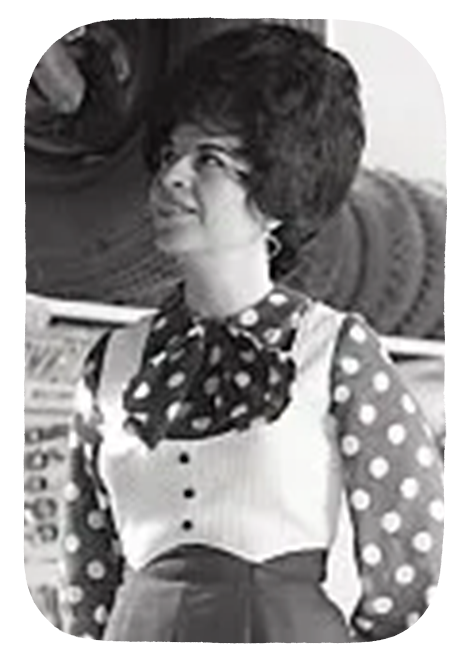
Additional Resources
Delores Blair Silva Velasquez-Ortega,
1936-2001
by Emily Peterson
Historical Research Intern, Better Days
A hard-working and courageous woman, Delores Blair Silva Velasquez-Ortega dedicated her life to advocating for members of the Chicano (Mexican-American) community in Utah. She was a trailblazer for Chicana women’s leadership in Utah as a leader of SOCIO, a leading Hispanic* grassroots civil rights organization. As the first woman to serve in the state Office of Hispanic Affairs, she was one of the first Hispanic women to work in state government.
Born on October 9, 1936 in McPhee, Colorado, Delores was primarily raised by her grandmother and parents. Her family moved to the rural community of Price, Utah when she was young, likely for job opportunities in mining and agriculture in Carbon County. To help her family make ends meet, Delores dropped out of high school and worked various jobs in sales, waitressing, laundry, and working on an assembly line in a factory. In 1956, she married John Silva and moved to Salt Lake City. She and John had five children.
Throughout her life, Delores was dedicated to serving members of the Hispanic community. While volunteering at St. Mary’s church in Ogden, she saw a group of elderly Hispanic citizens meeting with someone from a local nonprofit struggling to communicate, so she hopped into the meeting to translate into Spanish. Because of her ability to take initiative, she was offered a job to work for the state to primarily handle assisting Hispanic workers.
At the same time, she went to night school to earn her high school diploma and took college classes at Weber State and the University of Utah.

Delores Silva circa 1975, courtesy of The Ogden Standard Examiner
In 1968, inspired by her work for the state to do more to advocate for Hispanic people, Delores joined SOCIO, the Spanish-speaking Organization for Community, Integrity, and Opportunity. SOCIO was a new grassroots organization formed by Hispanic people across Utah to address the discrimination, provide needed resources for their community, and advocate for more Hispanic people to hold leadership positions.
During this time, the Chicano movement in the United States sought to empower Mexican-Americans to stand up against the unjust treatment and working conditions they experienced. They pushed back against pressure to assimilate and reject their Mexican-American culture and used the term “Chicano” (for men) or “Chicana” (for women) to demonstrate pride in their heritage and identity.
Unlike some other national Chicano civil rights organizations in the United States, SOCIO primarily focused on reforming laws, providing job training, organizing cultural events, and increasing representation rather than organizing protests and boycotts.
Serving in various local and state leadership roles, including vice president of SOCIO, Delores helped the Utah government hire more Mexican-Americans and created what became the Governor’s Advisory Council on Hispanic Affairs. Often traveling to various communities both inside and outside of Utah to advocate for the needs of the Hispanic community, she met other national leaders including Cesar Chavez. She also advocated for the opportunity for students to study Chicano history that was often left out of U.S. history textbooks.
Delores believed that increasing the number of Mexican-Americans in local and state leadership would lead to further progress for their community and volunteered on campaigns of local Hispanic political candidates. She also worked with the American GI Forum, the Utah State Board of Education, and served on the Governor’s Commission on the Status of Women and the mental health board.
Understanding the value of education in her own life, Delores became the first person hired at Weber State to address racial discrimination at the university as part of the new Equal Opportunity office. Despite often being the only woman in the room, by the end of her 2 years in the office, Delores had helped the university ensure men and women were paid equal pay for equal work and hire more minorities in leadership positions at the school.
Delores’ commitment to her career and activism created tension in her personal life as her husband did not support her involvement in politics. She divorced John Silva in 1975 and moved back to Denver, Colorado, where she sought to continue to expand her own opportunities by studying sociology and Spanish.
As someone who wasn’t afraid of new opportunities, Delores encouraged others to explore their potential and “[see] what you can do. A positive attitude is necessary. Go on thinking that you can do whatever you want to do.”
Despite her experience working in government and higher education, she had difficulty finding a job in similar roles in Denver. She developed interest in working with individuals struggling with drugs and alcohol and eventually helped to develop a national training program specifically for women dealing with these issues.
Delores eventually moved back to Utah, remarried, and remained involved in SOCIO. Because of her demonstrated skill in advocating for the Mexican-American community, in 1984, Delores became the first woman to hold the position of Director of the Office of Hispanic Affairs in Utah. As part of her role, she spoke up against police brutality toward Hispanic workers.
Aside from working and volunteering, Delores often loved celebrating her culture, especially through Mexican music, dance, and stories.
After spending her life devoted to advancing the rights of the Hispanic community, Delores retired in Idaho and passed away at the age of 65 in 2001. Her example and advocacy helped pave the way for other Hispanic women in Utah today because she always spoke up and sought to make a change, even when it was difficult.
*The term Hispanic refers to those who speak Spanish and was used by Delores Silva herself and other leaders at the time to describe the community she served. Today, some prefer the term Latine/Latino/Latina.

